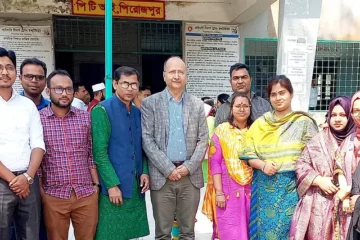Bangladesh Association of Software and Information Services (BASIS), the organization of the country's software business sector, was established on August 13, 1998. The organization recently celebrated its 25th anniversary. Basis president Russell T Ahmed talked about the role BASIS is playing in the development of the country's software sector and what role it will play in the future. Pallab Mohaimen and Ishtiaq Mahmud conducted this interview at BASIS office in the capital on February 20.
In the late 1990s, based on the recommendations of the JRC (Jamilur Reza Chowdhury) committee, the establishment of BASIS on the model of India's Nasscom. Basically the journey of BASIS started with the purpose of increasing the country's software exports, has it been successful after 25 years?
Russell T Ahmed: There are many criteria for success. The JRC committee was originally formed to determine what to do to export software from the country. Among the various recommendations of that committee was the establishment of separate organizations for information technology (IT) and information technology-based services (ITES) for software exports. BASIS started its journey in 1998 in the light of that recommendation. BASIS members currently export $1.8 billion worth of software abroad annually. The organization has also been established as the apex organization of the country's information technology sector. Having played a role in the development of the country's software sector for 25 years, BASIS will play an even more important role in the future.
We have heard of a software export target of $100 million a year after the establishment of BASIS. For several years this target has been called 5 billion dollars. How much software does Bangladesh actually export? Is it at all possible to export 5 billion dollars from the software and information technology services sector in the current situation?
Russell T Ahmed: If you want to run to achieve the target, you have to make some action plans. Maybe we had some deficiencies in this regard. The four major markets for our software exports are the United States, the European Union, the United Kingdom and Japan. There is a demand for around one crore skilled workers in the technology sector of the countries. If we can do the work of 1 million workers in the country, then it is possible to earn 2 billion dollars a year. Keeping this in mind, we have formulated action plans and strategies. We are talking about a 3/3 formula. The software sector, the educational institutions and the government - these three sectors have to work together. Three more things to do. One. Research. Suppose Japan needs skilled people in dotnet. We have that skilled manpower, but in Japan they need to know Japanese before they can be hired. Where to send people or how to capture a market requires specific research. Two. Country branding. No one considers Bangladesh as an ICT destination yet. So how do we think about giving work? For this, 'Bangladesh branding' should be done abroad by highlighting Bangladesh's capabilities in technology. Number three of the 3/3 formula is to improve skills in various subjects. Not only do you have to think about graduates in computer science, there is also demand for skilled people such as graphic designers, UI (user interface) designers.
To what extent can the software and ITES business sector play a role in achieving the Digital Bangladesh and current Smart Bangladesh goals announced by the government?
Russell T Ahmed: Digital Bangladesh is only based on Information and Communication Technology (ICT). But in the case of smart Bangladesh, all sectors have to be smart. Use of technology should be increased in all sectors. And in this case the ICT sector will be the nucleus of everything.
How big is the internal software and ITES market in Bangladesh?
Russell T Ahmed: We have a domestic market of about 2 billion dollars. In the future it may amount to 400 to 600 million dollars.
Who can be members of BASIS? How do members benefit?
Russell T Ahmed: At present BASIS has more than 2,300 associate, general, affiliate and international members. Organizations dealing with software and ITES can apply to become BASIS members. But for this, there must be a trade license. BASIS primarily works with governments on trade-related policies. The benefits of which the members enjoy. Membership of BASIS provides government incentives for exporting software. Membership of BASIS is mandatory to participate in software-based government tenders. In addition to these, members are given training on various topics from the base. The member institutions also get the opportunity to participate in various international fairs.
Does BASIS play any role in manpower development required for IT industry or is there any opportunity for BASIS to play a role?
Russell T Ahmed: We have a training center called Basis Institute of Technology and Management (BITM) for creating skilled manpower in the IT sector. The center has been conducting various IT based professional and short term courses for 12 years. No student trained from BITM is unemployed. There are plans to operate BITM on a larger scale in the future. Subjects that are in current demand in the market are chosen as subjects for training.






